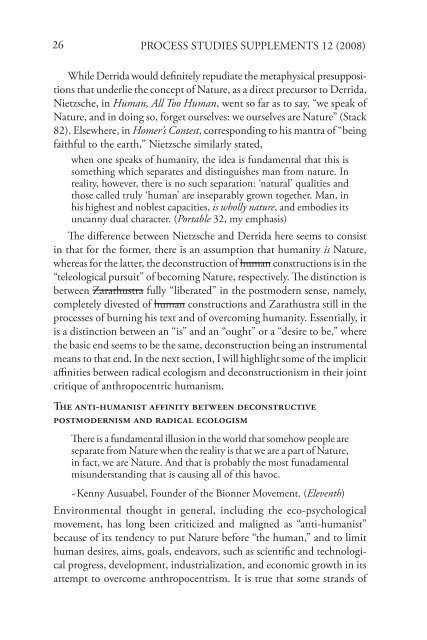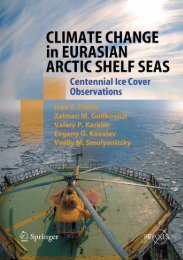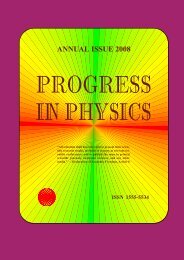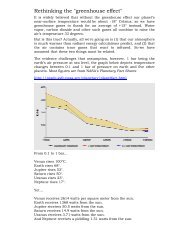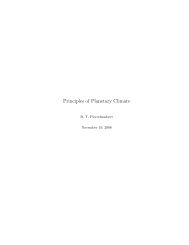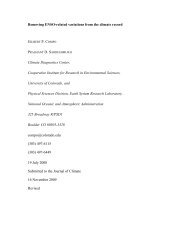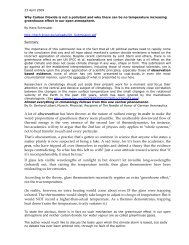Process Studies Supplement Overcoming Anthropocentric ... - Here
Process Studies Supplement Overcoming Anthropocentric ... - Here
Process Studies Supplement Overcoming Anthropocentric ... - Here
You also want an ePaper? Increase the reach of your titles
YUMPU automatically turns print PDFs into web optimized ePapers that Google loves.
26<br />
PROCESS STUDIES SUPPLEMENTS 12 (2008)<br />
While Derrida would definitely repudiate the metaphysical presuppositions<br />
that underlie the concept of Nature, as a direct precursor to Derrida,<br />
Nietzsche, in Human, All Too Human, went so far as to say, “we speak of<br />
Nature, and in doing so, forget ourselves: we ourselves are Nature” (Stack<br />
82). Elsewhere, in Homer’s Contest, corresponding to his mantra of “being<br />
faithful to the earth,” Nietzsche similarly stated,<br />
when one speaks of humanity, the idea is fundamental that this is<br />
something which separates and distinguishes man from nature. In<br />
reality, however, there is no such separation: ‘natural’ qualities and<br />
those called truly ‘human’ are inseparably grown together. Man, in<br />
his highest and noblest capacities, is wholly nature, and embodies its<br />
uncanny dual character. (Portable 32, my emphasis)<br />
The difference between Nietzsche and Derrida here seems to consist<br />
in that for the former, there is an assumption that humanity is Nature,<br />
whereas for the latter, the deconstruction of human constructions is in the<br />
“teleological pursuit” of becoming Nature, respectively. The distinction is<br />
between Zarathustra fully “liberated” in the postmodern sense, namely,<br />
completely divested of human constructions and Zarathustra still in the<br />
processes of burning his text and of overcoming humanity. Essentially, it<br />
is a distinction between an “is” and an “ought” or a “desire to be,” where<br />
the basic end seems to be the same, deconstruction being an instrumental<br />
means to that end. In the next section, I will highlight some of the implicit<br />
affinities between radical ecologism and deconstructionism in their joint<br />
critique of anthropocentric humanism.<br />
The anti-humanist affinity between deconstructive<br />
postmodernism and radical ecologism<br />
There is a fundamental illusion in the world that somehow people are<br />
separate from Nature when the reality is that we are a part of Nature,<br />
in fact, we are Nature. And that is probably the most funadamental<br />
misunderstanding that is causing all of this havoc.<br />
~Kenny Ausuabel, Founder of the Bionner Movement. (Eleventh)<br />
Environmental thought in general, including the eco-psychological<br />
movement, has long been criticized and maligned as “anti-humanist”<br />
because of its tendency to put Nature before “the human,” and to limit<br />
human desires, aims, goals, endeavors, such as scientific and technological<br />
progress, development, industrialization, and economic growth in its<br />
attempt to overcome anthropocentrism. It is true that some strands of


